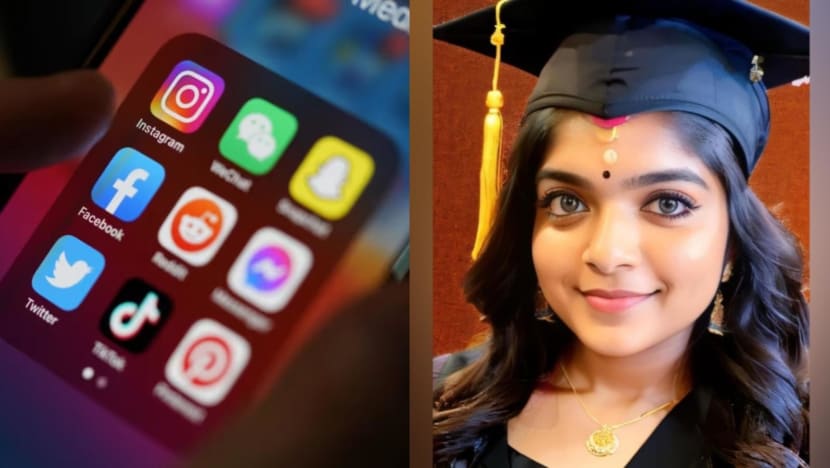Commentary: To hold Big Tech accountable, focus on the harms
From Malaysia to Brazil, free speech is being pitted against social media regulation. It’s missing the point, says Catherine Thorbecke for Bloomberg Opinion.

Composite of (left) popular social media apps and (right) Malaysian influencer Rajeswary Appahu, who went by the TikTok alias Esha, who took her life after being cyberbullied on the platform. (Photo: iStock/P Kijsanayothin, Instagram/_rajeswaryappahu)
TOKYO: In July, a popular TikTok creator in Malaysia reported to local police that she was being tormented on the platform by users threatening to rape and kill her. A day later, Rajeswary Appahu, better known online as Esha, died by suicide.
One of the individuals accused of cyberbullying her later pleaded guilty to communication offenses on TikTok and was hit with a RM100 (US$23) fine.
Malaysia’s Communications Minister said that the suicide was the “straw that broke the camel’s back” as he defended the nation’s sweeping new social media licensing requirements that are set to take effect next year. But could this far-reaching and opaque attempt to regulate Big Tech companies have prevented the tragedy?
How to hold tech firms accountable for the real-world harms that emerge from their services has become the most difficult governing test of our time, and is currently being debated across the globe.
Elon Musk’s X (formerly Twitter) went dark this week in Brazil amid a regulatory spat, and France last week charged Telegram founder Pavel Durov for complicity in crimes committed on his app. Mark Zuckerberg, CEO of Facebook parent company Meta Platforms, meanwhile, accused the United States government of pressuring him to censor pandemic-related content on his platforms in what some politicians paint as a win for free speech.
The divisive debate tends to fall into a simplistic trap that pits any regulation of powerful Big Tech against freedom of expression, and content moderation as some form of censorship. But the reality is much more nuanced.
TECH’S BIGGEST SHOWDOWN IN MALAYSIA
In Malaysia, a country of some 34 million ethnically, religiously and culturally diverse – as well as chronically online – people, this ongoing global debate is set to face its biggest showdown.
The Southeast Asian nation said that it will require all social media and messaging platforms with more than 8 million users to apply for a regulatory license and abide by yet-to-be finalised conditions.
Companies claim this will hamper business and are arguing for self-regulation. Dozens of civil society organisations fear it will erode free speech, and usher the country “towards the path of an authoritarian regime”.
Despite the backlash, the government is forging ahead with the plan, saying it aims to curb scams, cyberbullying, and protect young people online. Yet it’s hard to know what this regulation will truly do, because the guidelines haven’t been finalised.
Malaysians are right to be concerned about speech restrictions, and not in a flawed and self-serving billionaire kind of way. Avenues for freedom of expression have narrowed, and the government continues to use repressive laws to silence critics, Amnesty International said in a 2024 report.
Licensing is also used to exploit editorial control in the media. Malaysia plunged to 107th this year on the Reporters Without Borders World Press Freedom Index, down from 73rd last year. As traditional news ecosystems shrink, many Malaysians, like in the rest of the world, have turned to voicing opposition online.
It now seems the authorities are trying to censor content there as well. The government made the highest number of takedown requests to TikTok last year worldwide, skyrocketing from five such requests in 2021 to 2,202 requests in 2023.
Worries that this attempt to regulate social media could be abused to further choke free speech are warranted. (A local news outlet quoted the deputy prime minister as saying the licensing could help check the spread of negative perceptions about the government). Malaysian officials are right to want to regulate this industry, and a licensing scheme shows potential, but they must offer specifics about how exactly this plan will hold Big Tech to account.
NOT AS SIMPLE AS FREE SPEECH VS CONTENT MODERATION
Until they do that, it’s not clear how licensing social media would prevent the kind of cyberbullying that led to Esha's death, even though it's hard to imagine anyone would argue that trolling a woman online with threats of violence would constitute free speech.
We have to start somewhere. Malaysian lawmakers are looking into criminalising cyberbullying and finding ways to up the accountability of platforms – even without the licensing law.
Officials said TikTok pledged to look at what went wrong with Esha’s case and offer full support, including increasing the number of livestreaming and Tamil language moderators. More than anything, it seems that simple step could’ve helped prevent the attacks on the influencer the most.
The battle is a sobering reminder that these platforms – now so large and powerful – cannot be relied on as the main vehicles of civic discourse. They are not printing presses or town squares, they are businesses with growth models that are inherently opposed to social cohesion.
Divisive, inflammatory content often drives better user engagement than more complicated or boring truths. It’s not as simple as free speech versus content moderation, no matter how many times Musk tweets this and then orders his workers to amplify it.
Policymakers should laser in on the actual harms as they craft regulation. Malaysia’s vibrant society has shown resilience in rebuffing attempts to repress speech, but mounting online abuses have also exposed a need for more safeguards. How this showdown plays out could serve as a testing ground for other jurisdictions.
Where to get help:
Samaritans of Singapore Hotline: 1767
Institute of Mental Health’s Helpline: 6389 2222
Singapore Association for Mental Health Helpline: 1800 283 7019
You can also find a list of international helplines here. If someone you know is at immediate risk, call 24-hour emergency medical services.
















